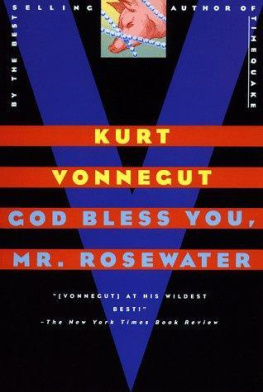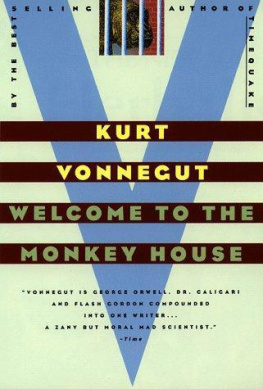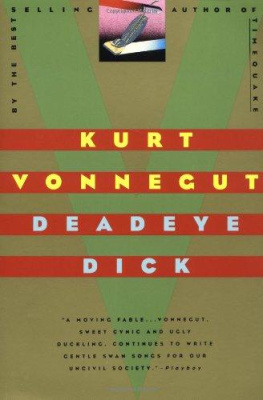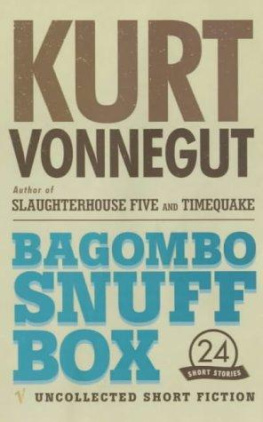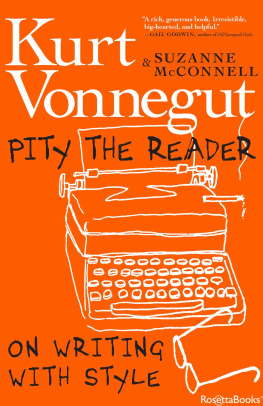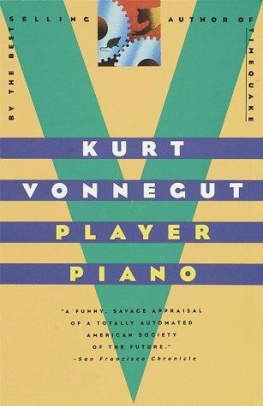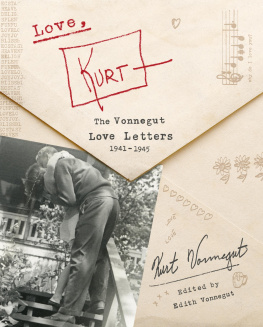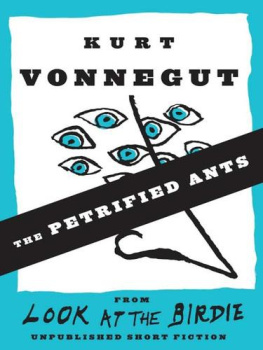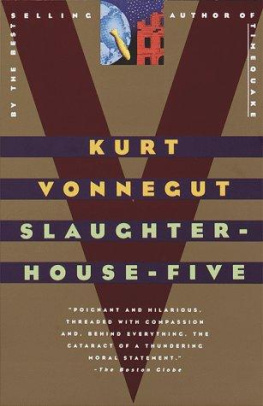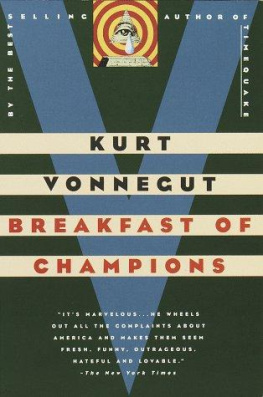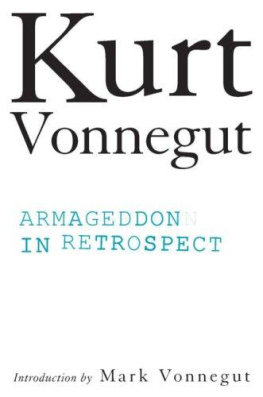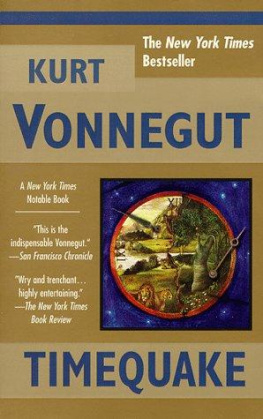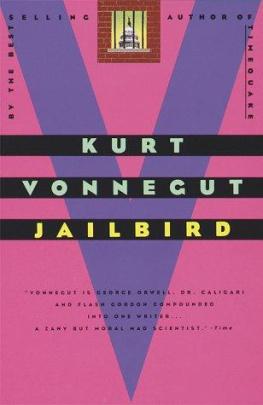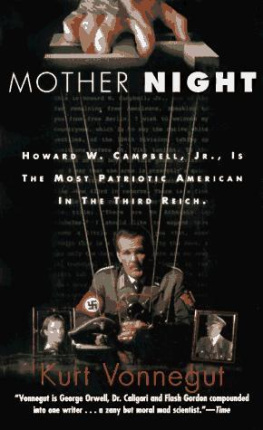Kurt Vonnegut - Mother Night
Here you can read online Kurt Vonnegut - Mother Night full text of the book (entire story) in english for free. Download pdf and epub, get meaning, cover and reviews about this ebook. year: 1999, publisher: Dial Press Trade Paperback, genre: Art. Description of the work, (preface) as well as reviews are available. Best literature library LitArk.com created for fans of good reading and offers a wide selection of genres:
Romance novel
Science fiction
Adventure
Detective
Science
History
Home and family
Prose
Art
Politics
Computer
Non-fiction
Religion
Business
Children
Humor
Choose a favorite category and find really read worthwhile books. Enjoy immersion in the world of imagination, feel the emotions of the characters or learn something new for yourself, make an fascinating discovery.

- Book:Mother Night
- Author:
- Publisher:Dial Press Trade Paperback
- Genre:
- Year:1999
- Rating:4 / 5
- Favourites:Add to favourites
- Your mark:
- 80
- 1
- 2
- 3
- 4
- 5
Mother Night: summary, description and annotation
We offer to read an annotation, description, summary or preface (depends on what the author of the book "Mother Night" wrote himself). If you haven't found the necessary information about the book — write in the comments, we will try to find it.
Mother Night — read online for free the complete book (whole text) full work
Below is the text of the book, divided by pages. System saving the place of the last page read, allows you to conveniently read the book "Mother Night" online for free, without having to search again every time where you left off. Put a bookmark, and you can go to the page where you finished reading at any time.
Font size:
Interval:
Bookmark:
A Man Without a Country
Armageddon in Retrospect
Bagombo Snuff Box
Between Time and Timbuktu
Bluebeard
Breakfast of Champions
Canary in a Cat House
Cats Cradle
Deadeye Dick
Fates Worse Than Death
Galapagos
God Bless You, Dr. Kevorkian
God Bless You, Mr. Rosewater
Happy Birthday, Wanda June
Hocus Pocus
Jailbird
Like Shaking Hands with God (with Lee Stringer)
Mother Night
Palm Sunday
Player Piano
The Sirens of Titan
Slapstick
Slaughterhouse-Five
Timequake
Wampeters, Foma & Granfalloons
Welcome to the Monkey House
TIGLATH-PILESER
THE THIRD
M Y NAME is Howard W. Campbell, Jr.
I am an American by birth, a Nazi by reputation, and a nationless person by inclination.
The year in which I write this book is 1961.
I address this book of mine to Mr. Tuvia Friedmann, Director of the Haifa Institute for the Documentation of War Criminals, and to whomever else this may concern.
Why should this book interest Mr. Friedmann?
Because it is written by a man suspected of being a war criminal. Mr. Friedmann is a specialist in such persons. He had expressed an eagerness to have any writings I might care to add to his archives of Nazi villainy. He is so eager as to give me a typewriter, free stenographic service, and the use of research assistants, who will run down any facts I may need in order to make my account complete and accurate.
I am behind bars.
I am behind bars in a nice new jail in old Jerusalem.
I am awaiting a fair trial for my war crimes by the Republic of Israel.
It is a curious typewriter Mr. Friedmann has given to meand an appropriate typewriter, too. It is a typewriter that was obviously made in Germany during the Second World War. How can I tell? Quite simply, for it puts at finger tips a symbol that was never used on a typewriter before the Third German Reich, a symbol that will never be used on a typewriter again.
The symbol is the twin lightning strokes used for the dreaded S.S., the Schutzstaffel, the most fanatical wing of Nazism.
I used such a typewriter in Germany all through the war. Whenever I had occasion to write of the Schutzstaffel, which I did often and with enthusiasm, I never abbreviated it as S.S., but always struck the typewriter key for the far more frightening and magical twin lightning strokes.
Ancient history.
I am surrounded by ancient history. Though the jail in which I rot is new, some of the stones in it, Im told, were cut in the time of King Solomon.
And sometimes, when I look out through my cell window at the gay and brassy youth of the infant Republic of Israel, I feel that I and my war crimes are as ancient as Solomons old gray stones.
How long ago that war, that Second World War, was! How long ago the crimes in it!
How nearly forgotten it is, even by the Jewsthe young Jews, that is.
One of the Jews who guards me here knows nothing about that war. He is not interested. His name is Arnold Marx. He has very red hair. He is only eighteen, which means Arnold was three when Hitler died, and nonexistent when my career as a war criminal began.
He guards me from six in the morning until noon.
Arnold was born in Israel. He has never been outside of Israel.
His mother and father left Germany in the early thirties. His grandfather, he told me, won an Iron Cross in the First World War.
Arnold is studying to be a lawyer. The avocation of Arnold and of his father, a gunsmith, is archaeology. Father and son spend most all their spare time excavating the ruins of Hazor. They do so under the direction of Yigael Yadin, who was Chief of Staff of the Israeli Army during the war with the Arab States.
So be it.
Hazor, Arnold tells me, was a Canaanite city in northern Palestine that existed at least nineteen hundred years before Christ. About fourteen hundred years before Christ, Arnold tells me, an Israelite army captured Hazor, killed all forty thousand inhabitants, and burned it down.
Solomon rebuilt the city, said Arnold, but in 732 B.C. Tiglath-pileser the Third burned it down again.
Who? I said.
Tiglath-pileser the Third, said Arnold. The Assyrian, he said, giving my memory a nudge.
Oh, I said. That Tiglath-pileser.
You act as though you never heard of him, said Arnold.
I never have, I said. I shrugged humbly. I guess thats pretty terrible.
Well said Arnold, giving me a schoolmasters frown, it seems to me he really is somebody everybody ought to know about. He was probably the most remarkable man the Assyrians ever produced.
Oh, I said.
Ill bring you a book about him, if you like, said Arnold.
Thats nice of you, I said. Maybe Ill get around to thinking about remarkable Assyrians later on. Right now my mind is pretty well occupied with remarkable Germans.
Like who? he said.
Oh, Ive been thinking a lot lately about my old boss, Paul Joseph Goebbels, I said.
Arnold looked at me blankly. Who? he said.
And I felt the dust of the Holy Land creeping in to bury me, sensed how thick a dust-and-rubble blanket I would one day wear. I felt thirty or forty feet of ruined cities above me; beneath me some primitive kitchen middens, a temple or twoand then
Tiglath-pileser the Third.
SPECIAL DETAIL
T HE GUARD who relieves Arnold Marx at noon each day is a man nearly my own age, which is forty-eight. He remembers the war, all right, though he doesnt like to.
His name is Andor Gutman. Andor is a sleepy, not very bright Estonian Jew. He spent two years in the extermination camp at Auschwitz. According to his own reluctant account, he came this close to going up a smokestack of a crematorium there:
I had just been assigned to the Sonderkommando, he said to me, when the order came from Himmler to close the ovens down.
Sonderkommando means special detail. At Auschwitz it meant a very special detail indeedone composed of prisoners whose duties were to shepherd condemned persons into gas chambers, and then to lug their bodies out. When the job was done, the members of the Sonderkommando were themselves killed. The first duty of their successors was to dispose of their remains.
Gutman told me that many men actually volunteered for the Sonderkommando.
Why? I asked him.
If you would write a book about that, he said, and give the answer to that question, that Why?you would have a very great book.
Do you know the answer? I said.
No, he said. That is why I would pay a great deal of money for a book with the answer in it.
Any guesses? I said.
No, he said, looking me straight in the eye, even though I was one of the ones who volunteered.
He went away for a little while, after having confessed that. And he thought about Auschwitz, the thing he liked least to think about. And he came back, and he said to me:
There were loudspeakers all over the camp, he said, and they were never silent for long. There was much music played through them. Those who were musical told me it was often good musicsometimes the best.
Thats interesting, I said.
There was no music by Jews, he said. That was forbidden.
Naturally, I said.
And the music was always stopping in the middle, he said, and then there was an announcement. All day long, music and announcements.
Very modern, I said.
He closed his eyes, remembered gropingly. There was one announcement that was always crooned, like a nursery rhyme. Many times a day it came. It was the call for the Sonderkommando.
Oh? I said.
Font size:
Interval:
Bookmark:
Similar books «Mother Night»
Look at similar books to Mother Night. We have selected literature similar in name and meaning in the hope of providing readers with more options to find new, interesting, not yet read works.
Discussion, reviews of the book Mother Night and just readers' own opinions. Leave your comments, write what you think about the work, its meaning or the main characters. Specify what exactly you liked and what you didn't like, and why you think so.

